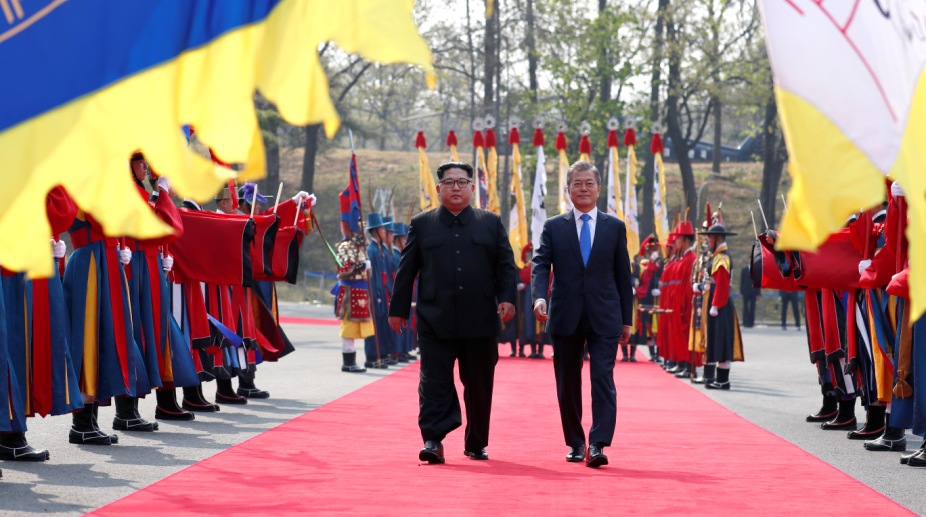South Korea to hold meeting of diplomatic missions next week
South Korea will open an annual meeting of its top envoys abroad next week with a focus on strengthening its diplomacy amid geopolitical challenges, the foreign ministry said on Thursday.
North Korea will move its clocks 30 minutes forward to unify with the South’s time zone starting this Saturday as a conciliatory gesture after last week’s inter-Korean summit, the North’s official news agency said.

North Korea's leader Kim Jong Un (L) and South Korea's President Moon Jae-in (R) take part in a welcoming ceremony before walking to the official summit Peace House building on the southern side of the truce village of Panmunjom on April 27, 2018. North Korean leader Kim Jong Un and the South's President Moon Jae-in sat down to a historic summit on April 27 after shaking hands over the Military Demarcation Line that divides their countries in a gesture laden with symbolism. (Photo: AFP/ Korea Summit Press Pool)
North Korea will move its clocks 30 minutes forward to unify with the South’s time zone starting this Saturday as a conciliatory gesture after last week’s inter-Korean summit, the North’s official news agency said.
The two countries on the divided peninsula have had different time zones since 2015 when the North suddenly changed its standard time to 30 minutes behind the South.
Pyongyang cited a nationalistic rationale, saying it would return the North to the time zone used before Japan’s 1910-45 colonial rule of the peninsula to mark the 70th anniversary of its liberation from Tokyo.
Advertisement
But North Korean leader Kim Jong-un promised to change the time zone back during the historic summit with South Korean President Moon Jae-in, KCNA reported.
The pair held the summit – the third such meeting between the two Koreas – at the border truce village of Panmunjom, during which Kim set the foot on the south side of the border for the first time and the two leaders pledged to pursue denuclearisation and a permanent peace.
Kim said he found it a “painful wrench” to see two wall clocks hanging at the summit venue showing different times for the two neighbours, KCNA reported.
Kim expressed “his resolution to unify the two times … as the first practical step for national reconciliation and unity,” it said.
North Korea’s parliament today adopted a decree to return to the same time zone as South Korea from May 5, the state news agency said.
Moon’s spokesman Yoon Young-chan earlier hailed the gesture as a “symbolic move” for better ties between Seoul and Pyongyang.
The creation of “Pyongyang time” drew criticism from Moon’s conservative predecessor Park Geun-hye for further deepening the disparity between the two Koreas, whose division was sealed by the 1950-53 Korean War.
The two countries have remained technically at war after the conflict ended with an armistice instead of a peace treaty. Moon and Kim on Friday vowed to seek a formal end to the war.
North Korea is not the only country to have used a time zone to assert its national identity.
China and India have both imposed single time zones to promote unity across their vast territories, with people in China’s westernmost provinces keeping to Beijing time despite the sun rising two hours later than in the capital.
Most time zones around the world are set on the hour, but some differ from Coordinated Universal Time (UTC) by 30 or even 45 minutes – Myanmar’s is half an hour behind its neighbour Thailand’s, for example.
Nepal, whose clocks run five hours and 45 minutes ahead of UTC, chose its unusual time zone after India’s meridian was deemed too far west for the small Himalayan nation to anchor itself to, and the next one along too far east.
So in 1956, Nepal decided to peg its standard time at Mount Gaurishankar, a peak east of the capital Kathmandu, putting it 15 minutes ahead of India – a way to assert itself as a nation independent from its giant neighbour.
And despite lying far to the west of Europe, mainland Spain has been in the same time zone as central Europe since 1942, when Francisco Franco’s fascist government adopted it to be in line with Nazi Germany.
Advertisement